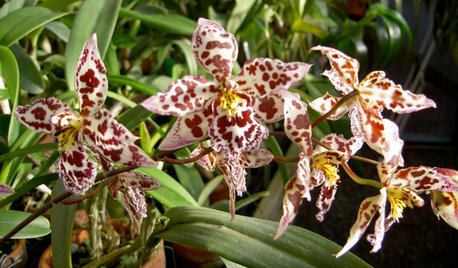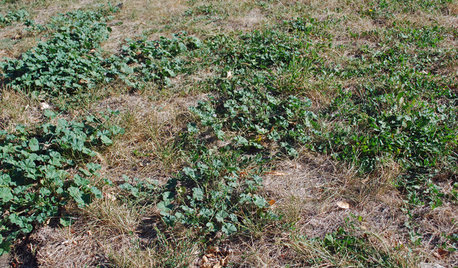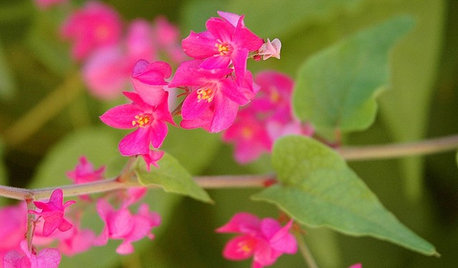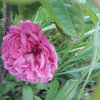To Spray or not to Spray?
Molineux
16 years ago
Featured Answer
Sort by:Oldest
Comments (102)
sandy808
16 years agolast modified: 9 years agoingrid_vc so. CA zone 9
16 years agolast modified: 9 years agoRelated Discussions
To spray or not to spray?
Comments (6)Thanks for the advice! I will then be spraying. This is my second round with roses. Before I lived in an apt with a rose bed, and last year I inherited 28 roses when we bought our place, so have not been in place to select disease resistance up front. The ones I have been able to identify aren't described as being prone to diseases (they are almost all David Austin) - but they weren't well cared for for several years....See Moreto spray or not to spray?
Comments (1)there is a fruit forum ... i gave up on apples.. as they normally require spraying about every 30 to 45 days through the entire season to produce a viable crop ... i presume yours are young trees.. and you have a few years to learn the whole process and decide if you want to fool with all the spraying... of the 12 trees that were on the lot when i moved in.. only one is left..and that is there for the kids to climb in ... good luck ken...See MoreTo Spray or not to Spray?
Comments (24)Some vital points made about how location can affect the need to spray fungicides. As can weather and it is our weather that led me to spraying this year. While we normally suffer from high temps and high humidity both, it is normally dry (as in minimal rainfall) and chronic diseases like septoria and early blight are normally found at tolerable levels here. But the past 2 years,and this one so far, have been markedly different here with almost constant daily rain - enough to rapidly bring the lakes up to maximum flood pool - and little sun. Plus it has been inordinately cool. Those conditions are ripe for the common diseases. So I am electing to spray this year - not out of any fear of late blight, but just in the hopes of controlling the fungal and bacterial diseases to a degree. You see it doesn't have to be and either/or issue - spray or don't spray. Just as many of us here are compromise organic gardeners, many more than get credit for it since we aren't organic purists, one can compromise on this issue too. If you feel that fungicides are dangerous, even the organic-approved ones, then you can always consider applying them only early in the season when the weather is its most risky and before fruit has set. Or only apply it during a period of severe weather change, or only after signs of disease to control if not prevent. There is gray, not just black and white on any issue. So, Big Daddy, after reading your message I would feel horrible spraying anything on my tomatoes. Joy I'm sorry you feel that way - "horrible" - since it reflects on those of us who choose to use fungicides. It is your choice of course. But I am curious as to how you can come to that conclusion about fungicides yet justify to yourself the use of Sevin in your garden? I am always amazed at the number of gardeners who accept highly toxic chemicals to kill bugs, any bugs, yet find disease controls unacceptable. Is it just because we find bugs ugly? Or because they are alive? Makes little sense to me since diseases pose a much greater threat to the garden than do the bugs. And it is especially difficult to understand when the disease controls, in general, are rated as much less toxic than the pest controls. But to each his own. ;) Dave...See MoreTo spray or not to spray!
Comments (7)If they don't look thirsty, don't water as Chris says! You can also try the wooden dowel/skewer trick to check soil moisture as well. Depending on your soil composition and light exposure, it can take a long time dry out even with 30-35C consistent daytime temps! I am in Ontario (6a) and not too far off from Ohio. Here are the moisture levels in my front yard:Before I used to water my plants in the yard... now I don't even bother. It rained a fair bit early June, but July and August have been quite dry. Maybe if it doesn't rain in another 2 weeks I'll break out the hose! In contrast, I'm watering my succulents on the roof every 2 days....See Moresandy808
16 years agolast modified: 9 years agomelissa_thefarm
16 years agolast modified: 9 years agoogroser
16 years agolast modified: 9 years agoingrid_vc so. CA zone 9
16 years agolast modified: 9 years agoMolineux
16 years agolast modified: 9 years agoolga_6b
16 years agolast modified: 9 years agosandy808
16 years agolast modified: 9 years agoingrid_vc so. CA zone 9
16 years agolast modified: 9 years agobuford
16 years agolast modified: 9 years agoMolineux
16 years agolast modified: 9 years agoogroser
16 years agolast modified: 9 years agoMolineux
16 years agolast modified: 9 years agojerijen
16 years agolast modified: 9 years agojeff_zephyr
16 years agolast modified: 9 years agosandy808
16 years agolast modified: 9 years agoberndoodle
16 years agolast modified: 9 years agoburntplants
16 years agolast modified: 9 years agocupshaped_roses
16 years agolast modified: 9 years agobuford
16 years agolast modified: 9 years agodublinbay z6 (KS)
16 years agolast modified: 9 years agomike_rivers
16 years agolast modified: 9 years agoberndoodle
16 years agolast modified: 9 years agojardineratx
16 years agolast modified: 9 years agosandy808
16 years agolast modified: 9 years agocupshaped_roses
16 years agolast modified: 9 years agoMaryInSpokane
16 years agolast modified: 9 years agomichaelg
16 years agolast modified: 9 years agosandy808
16 years agolast modified: 9 years agobuford
16 years agolast modified: 9 years agojerijen
16 years agolast modified: 9 years agomelissa_thefarm
16 years agolast modified: 9 years agobuford
16 years agolast modified: 9 years agosandy808
16 years agolast modified: 9 years agoduchesse_nalabama
16 years agolast modified: 9 years agojerijen
16 years agolast modified: 9 years agoerasmus_gw
16 years agolast modified: 9 years agosandy808
16 years agolast modified: 9 years agolemecdutex
16 years agolast modified: 9 years agocupshaped_roses
16 years agolast modified: 9 years agoMolineux
16 years agolast modified: 9 years agosandy808
16 years agolast modified: 9 years agolemecdutex
16 years agolast modified: 9 years agoMolineux
16 years agolast modified: 9 years agodublinbay z6 (KS)
16 years agolast modified: 9 years agolemecdutex
16 years agolast modified: 9 years agorabidgardener
16 years agolast modified: 9 years agobuford
16 years agolast modified: 9 years ago
Related Stories

MATERIALSInsulation Basics: What to Know About Spray Foam
Learn what exactly spray foam is, the pros and cons of using it and why you shouldn’t mess around with installation
Full Story
FLOWERSOrchids 101: Frilly Oncidiums Dance Their Way to Center Stage
Sprays of flowers characterize these New World orchids
Full Story
DIY PROJECTSDining Set Makeover: Paint and Tea-Tinted Fabric Make Old Chairs New
Reclaim dated dining chairs for far less than buying new, using spray paint, modern fabric and a handful of tea bags
Full Story
GARDENING GUIDESWeed War: When and How to Use Chemical Herbicides
Before you spray, arm yourself with knowledge about which weed killers — natural or synthetic — are right for your yard
Full Story
HOME INNOVATIONSNow Approaching the Emerald City
Urbanites are spraying moss graffiti on walls and covering roofs in plants — and city regulators and designers are supporting the cause
Full Story
GARDENING GUIDESGreat Design Plant: Antigonon Leptopus in California and Desert Gardens
Dry climates can enjoy sprays of delicate pink flowers and heart-shaped leaves on this drought-tolerant, summer-flowering vine
Full Story
HOUSEKEEPINGThe Best Way to Get Your Windows Spotlessly Clean
Learn the pros’ tips and tricks for cleaning windows and getting them streak-free
Full Story
BATHROOM DESIGN21 Dream Showers Let You Soap Up in Style
These sensational showers have it all: spectacular design, luxurious materials and sleek high-tech features
Full Story
LANDSCAPE DESIGNLay of the Landscape: Coastal Garden Style
Seaside gardens can be the ultimate in soothing landscapes if you know how to work with the elements and choose the right plants
Full Story
HOUSEKEEPINGHow to Wash Your House
Avoid damage to siding and plants while getting your home's exterior shining clean, with this guide to using pressure washers and hoses
Full Story






lemecdutex